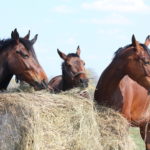In the July/August ?11 issue of The Trail Rider, you’ll find seven ways to use green fly control in barn and on the trail (?Green Fly-Fighting Power,? Seasonal Guide).

One ?green? fly control option for the barn is by using a horse manure management plan. There’s a good chance that those pesky insects buzzing in your ear were born in your horse manure pile. Flies lay their eggs close to sources of rotting organic matter, so the bigger your pile of muck, the bigger your fly population will likely be. A horse manure management plan can help keep the fly population down.
Here are some tips for green fly control to help you handle manure on your property the right way with a horse manure management plan.
- Daily remove manure and dirty bedding from stalls and paddocks. It takes a minimum of eight days for a fly to develop into its adult stages, so when the premises are cleaned regularly, it prevents flies from hatching.
- Keep manure piles as far from the barn as possible.
- Research which types of flies are common in your area. You?ll then know where they?re most likely to breed and in what season, as well as the best methods for controlling populations.
- If possible, rotate your horses? grazing pastures to avoid manure buildup in one particular area.
- Removing manure from your property also helps to keep it at a manageable level. Find out if your area offers a manure share program. Instead of disposing of manure and bedding at landfills, garbage haulers transport the waste to a composting facility. The compost is then utilized by local farms and gardeners as rich fertilizer.
- Compost! One of the best ways to manage manure is to speed up the decomposition process. Setting up a compost system takes some extra planning and time in the beginning, but upkeep can be very simple. To learn how to start your own compost system, see the University of Minnesota Extension?s online guide, ?Manure and Pasture Management for Recreational Horse Owners? (www.extension.umn.edu).





